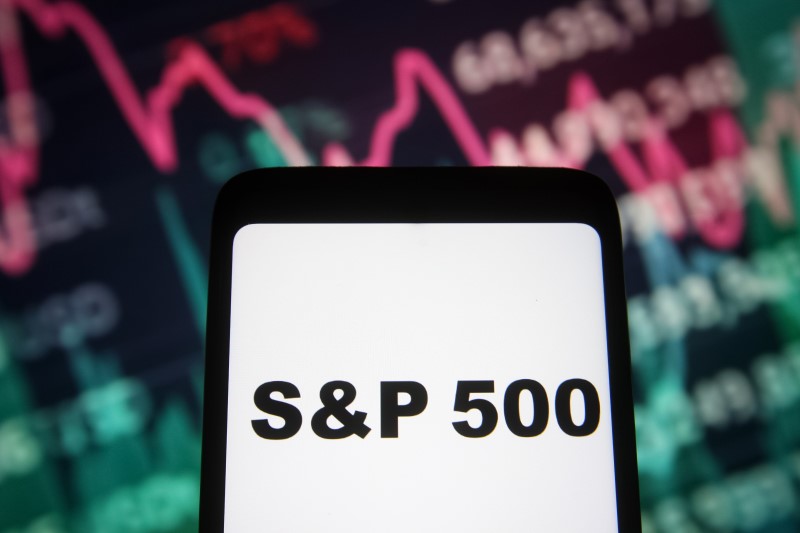Investing
S&P 500, Nasdaq notch biggest weekly losses since March

© Reuters. Traders work on the floor of the New York Stock Exchange (NYSE) in New York City, U.S., August 15, 2023. REUTERS/Brendan McDermid
By Stephen Culp
NEW YORK (Reuters) – Wall Street see-sawed to a lower close on Friday, capping a tumultuous week during which benchmark Treasury yields hit 16-year highs and investors digested the Federal Reserve’s hawkish outlook revisions.
All three major U.S. stock indexes oscillated for much of the session but ended red.
All three posted weekly losses, with the and the Nasdaq registering their largest Friday-to-Friday percentage drops since March.
On Thursday, the S&P 500 dipped below its 100-day moving average – a key support level – for the first time since March, Its failure to break above that level suggests the index is still under downward pressure.
“This week is about some Fed messaging colliding with overly optimistic equity investors,” said Zachary Hill, head of portfolio management at Horizon Investments in Charlotte, North Carolina.
Hill added that investors have “wanted to trade peak interest rates for almost a year now.” But he said it was clear in remarks this week by Fed Chair Jerome Powell “and in the dot plot that the Fed doesn’t think we’re there yet.”
“This week’s stock action has been about digesting that reality.”
Benchmark U.S. Treasury yields retreated from 16-year highs as investors turned their focus from hawkish Fed guidance to key economic data waiting in the wings.
Investors were still digesting the Fed’s decision to let its key interest rate stand, but update its quarterly Summary Economic Projections to suggest restrictive monetary policy will remain in place longer than previously anticipated.
On Friday, remarks from Fed Governor Michelle Bowman supported the FOMC hawks, suggesting the Fed funds target rate should be raised further and held “at a restrictive level for some time” to bring inflation down to the central bank’s 2% target.
“There are a lot of factors working against a soft landing and that’s something the Fed needs to be reminded of, because pushing rates higher could push us into recession,” said Robert Pavlik, senior portfolio manager at Dakota Wealth in Fairfield, Connecticut.
The fell 106.58 points, or 0.31%, to 33,963.84, the S&P 500 lost 9.94 points, or 0.23%, to 4,320.06 and the dropped 12.18 points, or 0.09%, to 13,211.81.
Among the 11 major sectors of the S&P 500, consumer discretionary suffered the steepest percentage loss, while tech and energy were the only gainers.
Ford Motor (NYSE:) Co gained 1.9% after the striking United Auto Workers union reported progress in talks with the automaker.
Activision Blizzard (NASDAQ:) added 1.7% in the wake Britain’s antitrust regulator’s statement that Microsoft Corp (NASDAQ:)’s restructured $69 billion acquisition of the company by “opens the door” to the biggest-ever gaming deal being cleared.
U.S.-listed shares of Chinese firms including PDD Holdings, JD (NASDAQ:).com, Li Auto and Baidu (NASDAQ:) rose between 2% and 4% on signs of an economic a rebound, while Alibaba (NYSE:) jumped 5.0% after Bloomberg reported that report the company’s logistics arm Cainiao was planning to file for a Hong Kong IPO as soon as next week.
Declining issues outnumbered advancing ones on the NYSE by a 1.12-to-1 ratio; on Nasdaq, a 1.29-to-1 ratio favored decliners.
The S&P 500 posted one new 52-week high and 35 new lows; the Nasdaq Composite recorded 33 new highs and 321 new lows.
Volume on U.S. exchanges was 9.47 billion shares, compared with the 10.09 billion average for the full session over the last 20 trading days.
Read the full article here

-

 Investing7 days ago
Investing7 days agoBank regulator gives BlackRock new deadline on bank stakes, Bloomberg reports By Reuters
-

 Side Hustles3 days ago
Side Hustles3 days agoWhy the Best CEOs Think Like Anthropologists
-

 Side Hustles6 days ago
Side Hustles6 days agoHow to Craft Marketing Campaigns That Reach Multiple Generations
-

 Side Hustles6 days ago
Side Hustles6 days agoLA Rental Prices Skyrocketing Despite Price Gouging Laws
-

 Make Money4 days ago
Make Money4 days agoEarn More in 2025: Top 10 High-Yield Savings Accounts Revealed
-

 Side Hustles7 days ago
Side Hustles7 days agoFormer Zillow Execs Target $1.3T Market
-

 Passive Income4 days ago
Passive Income4 days agoHow Pets Can Promote Better Health and Well-Being in the Workplace
-

 Side Hustles4 days ago
Side Hustles4 days ago10 Roles That Are Surprisingly Well-Suited for Outsourcing


















